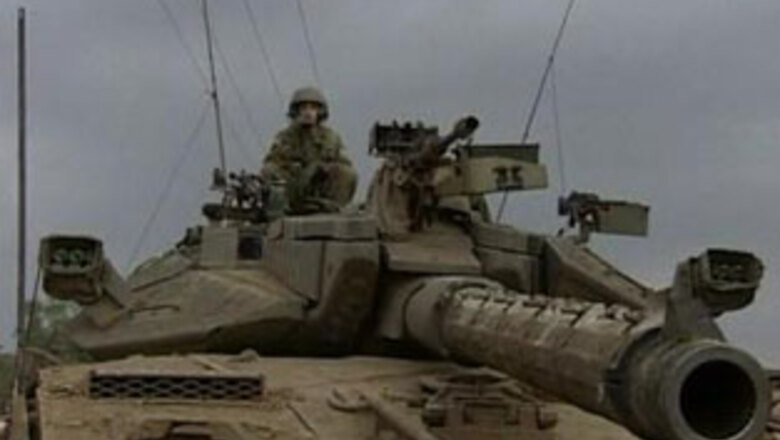
views
Jerusalem: Israel completed a troop pullout from the Hamas-ruled Gaza Strip on Wednesday, starting its relationship with US President Barack Obama by quitting Palestinian land devastated by its 22-day offensive. "We've redeployed on our side of the frontier and we will follow events closely," said Mark Regev, a spokesman for Israeli Prime Minister Ehud Olmert. "If Hamas breaks the ceasefire, we of course reserve the right to act to protect our people."
Obama's predecessor, George W. Bush, endorsed Israel's right to defend itself against rocket fire by the Gaza Strip's ruling Hamas Islamists. Obama, before taking office, declined to comment in detail on the Gaza crisis. Under international pressure to end the deadliest Israeli-Palestinian fighting in decades, Israel and Hamas declared separate ceasefires on Sunday, opening the way for more aid to be brought into the rubble-strewn enclave where thousands are homeless.
Reconstruction, if it can be launched in light of the frost between Hamas and the West, may cost close to $2 billion, according to Palestinian and international estimates. Diplomatic efforts led by Egypt were focusing on reaching a long-term Israel-Hamas truce deal, far short of an accord on Palestinian statehood sought by the United States and other international peace brokers. Israel's attacks in an offensive it began on December.
27 killed some 1,300 Palestinians. Gaza medical officials said the Palestinian dead included at least 700 civilians. Israel said hundreds of militants died and that it dealt Hamas a strong blow that had boosted the Jewish state's power of deterrence and drawn international pledges to help to prevent the Islamist group from replenishing its rocket arsenal.
Ten Israeli soldiers and three civilians, hit by cross-border rocket fire, were killed in the conflict. Calling the troop withdrawal a "victory for Palestinian resistance", Hamas demanded a lifting of the blockade Israel tightened on the Gaza Strip after the Islamist group seized control of the territory from the Fatah movement in 2007.
Israel said at the start of the military campaign it never intended for its army, which quit the Gaza Strip in 2005 after 38 years of occupation, to remain there permanently. Israel had withdrawn most of its forces before Obama was sworn in on Tuesday, in a move analysts saw as an attempt to avoid any early tensions with his administration that could cloud the beginning of a new era in a key alliance.
The United Nations, whose secretary-general, Ban Ki-moon, toured Gaza on Tuesday and described the destruction he witnessed as heartbreaking, has estimated some $330 million is needed for urgent aid. Although aid agencies said they planned a massive inflow of supplies through Israeli crossings, help will be complicated by the Western boycott of Hamas as a "terrorist" organisation and an Israeli blockade on many items, including building materials, that can be used to make weapons.
Addressing concerns in Israel that Obama would soften Washington's policy towards Hamas and another Israeli foe, Iran, Vice Premier Haim Ramon said: "Let's not fear President Obama. "I am convinced that President Obama and his team want to achieve what is essential to Israel -- two states for two peoples," Ramon told Israel Radio. In his inaugural speech, Obama promised to reach out to Muslims worldwide and "seek a new way forward, based on mutual interest and mutual respect".
Obama is expected to move quickly to name a Middle East envoy, possibly former Sen. George Mitchell, who had tried on behalf of the Clinton and Bush administrations to bring about an end to Israeli-Palestinian violence. In a 2001 report, Mitchell called for a freeze in the construction of Jewish settlements on occupied Palestinian land and for the Palestinians, who were waging an uprising, to stop attacks on Israelis.
Hailing Obama's election as "a change of historic significance", Israeli President Shimon Peres said: "What can be expected of the new president is a winning team to really rout violence from the Middle East and move the peace process forward." Bush failed in his efforts, late in his second term, to reach at least a framework peace deal in renewed talks between Israel and President Mahmoud Abbas's Palestinian Authority.
Hamas officials and an Israeli envoy planned to meet separately with Egyptian mediators in Cairo on Thursday to discuss ways to make the ceasefire "durable" and a reopening of border crossings, an official close to the talks said. Olmert has declared his government's mission accomplished -- noting a flurry of diplomatic efforts by the United States, Egypt and European countries to prevent Hamas rearming. That would mean as yet unspecified measures to stop Hamas smuggling weapons across the Egypt-Gaza frontier, a sensitive matter given Cairo's past efforts to play down its scope.




















Comments
0 comment